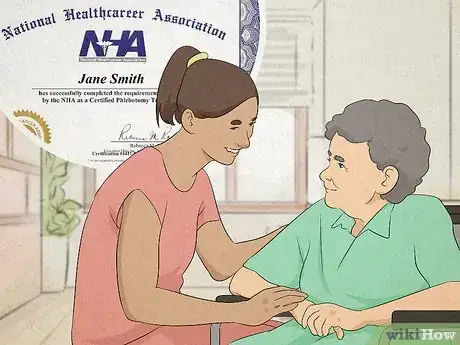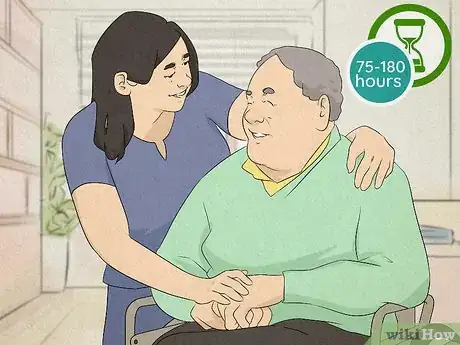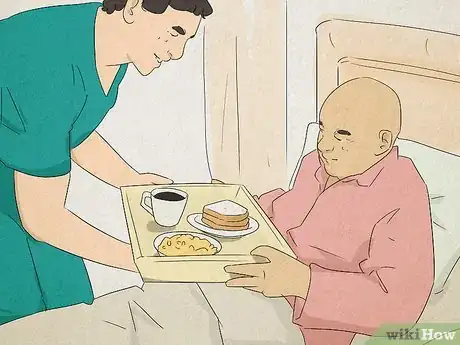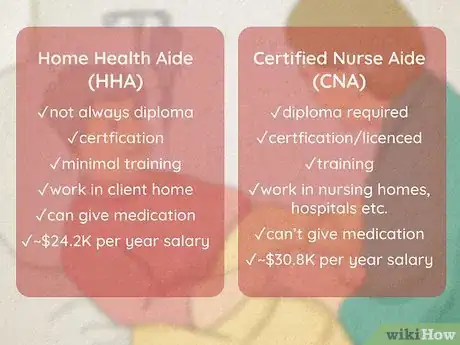This article was medically reviewed by Luba Lee, FNP-BC, MS and by wikiHow staff writer, Jessica Gibson. Luba Lee, FNP-BC is a Board-Certified Family Nurse Practitioner (FNP) and educator in Tennessee with over a decade of clinical experience. Luba has certifications in Pediatric Advanced Life Support (PALS), Emergency Medicine, Advanced Cardiac Life Support (ACLS), Team Building, and Critical Care Nursing. She received her Master of Science in Nursing (MSN) from the University of Tennessee in 2006.
There are 8 references cited in this article, which can be found at the bottom of the page.
wikiHow marks an article as reader-approved once it receives enough positive feedback. In this case, 100% of readers who voted found the article helpful, earning it our reader-approved status.
This article has been viewed 81,492 times.
If you're looking for an entry-level job in the medical field where you can really make a difference in people's lives, a home health aide (HHA) might be perfect. As an HHA, you're trained to give care in private homes and residential facilities. This means you'll probably have flexible hours and tasks, so every day is a little different! To get a better idea of how to become an HHA, read a few of the most common questions.
Steps
What are the requirements?
-
1A high-school degree is great, but not required. Some high schools even offer basic health care courses that can help prepare you to become an HHA. Check with your state's board of nursing for state-specific requirements. Instead of requiring a medical or advanced educational degree, you usually just need home health aid training.[1]
-
2Complete at least 75 hours of home health aid training. Even though state requirements vary, federal guidelines require a minimum of 74 training hours. Half of HHAs do their training at local community colleges, although home health agencies also offer training.[2]
-
3Take the Medical Aide Certification Exam (MACE). Some states require you to pass the MACE in order to be an HHA. This national exam is a multiple-choice computer-based exam and it covers information you should have learned during your training. Specifically, it will test your knowledge of your HHA duties, how to properly give medication, how to report a patient's health condition, and ethical issues surrounding care.[3]
- Check with the testing website to see if you can take the exam online at home.[4] If you can't, your training facility should give you testing dates and locations.
- You'll need to pay a $120 exam fee when you register to take the exam.
How do I find a job as a home health aide?
-
1Once you're qualified, check your local newspaper or call a home health agency. The Department of Health and Human Services revealed that most HHAs found their jobs by checking advertisements in the newspaper, on TV, or on the radio. You may also know about potential HHA jobs if you work in another healthcare setting. Don't forget that family and friends may know of possible HHA jobs, too.[9]
- If a home health agency isn't currently hiring, check back in another week. New jobs frequently open up in the home healthcare field so it pays to check.
-
2Fill out an application and give your resume to land the position. The agency may direct you to fill out an online application or you can drop one of along with your resume. If you don't hear anything from the agency within a few days, call them and ask about setting up an interview. This shows that you're eager and want the job.[10]
- Your chances at getting an HHA job are great if you've completed your training. The Bureau of Labor Statistics forecasts 34% growth in HHA jobs within the next 10 years.
- If you're called for an interview, be detailed about what experience you gained during training. You'll probably need to give specific examples of care that you gave to someone in their home.
References
- ↑ https://aspe.hhs.gov/basic-report/understanding-direct-care-workers-snapshot-two-americas-most-important-jobs-certified-nursing-assistants-and-home-health-aides#train
- ↑ https://aspe.hhs.gov/basic-report/understanding-direct-care-workers-snapshot-two-americas-most-important-jobs-certified-nursing-assistants-and-home-health-aides#train
- ↑ https://www.ncsbn.org/mace-exam.htm
- ↑ https://home.pearsonvue.com/Test-takers.aspx
- ↑ https://phinational.org/wp-content/uploads/2017/07/hha-training-reqs.pdf
- ↑ https://aspe.hhs.gov/basic-report/understanding-direct-care-workers-snapshot-two-americas-most-important-jobs-certified-nursing-assistants-and-home-health-aides
- ↑ https://aspe.hhs.gov/basic-report/understanding-direct-care-workers-snapshot-two-americas-most-important-jobs-certified-nursing-assistants-and-home-health-aides
- ↑ https://www.bls.gov/oes/2018/may/oes311011.htm
- ↑ https://aspe.hhs.gov/basic-report/understanding-direct-care-workers-snapshot-two-americas-most-important-jobs-certified-nursing-assistants-and-home-health-aides#find
About This Article
To become a home health aide, determine your state’s or region's requirements. Usually, no education other than a GED is required to apply for a position, but you can stand out from the crowd and demonstrate professionalism by taking training courses online or through a local college. After completing coursework, take the Direct Care Alliance Personal Care and Support Credential Exam to certify your abilities and increase your value. Then, put together a strong resume that details your experience and education and start applying for jobs! For tips on putting together a great resume for a home health aide position, read on!








































































